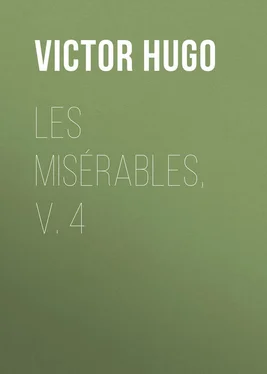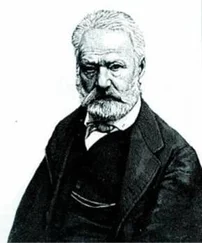Victor Hugo - Les Misérables, v. 4
Здесь есть возможность читать онлайн «Victor Hugo - Les Misérables, v. 4» — ознакомительный отрывок электронной книги совершенно бесплатно, а после прочтения отрывка купить полную версию. В некоторых случаях можно слушать аудио, скачать через торрент в формате fb2 и присутствует краткое содержание. Жанр: literature_19, foreign_antique, foreign_prose, на английском языке. Описание произведения, (предисловие) а так же отзывы посетителей доступны на портале библиотеки ЛибКат.
- Название:Les Misérables, v. 4
- Автор:
- Жанр:
- Год:неизвестен
- ISBN:нет данных
- Рейтинг книги:4 / 5. Голосов: 1
-
Избранное:Добавить в избранное
- Отзывы:
-
Ваша оценка:
- 80
- 1
- 2
- 3
- 4
- 5
Les Misérables, v. 4: краткое содержание, описание и аннотация
Предлагаем к чтению аннотацию, описание, краткое содержание или предисловие (зависит от того, что написал сам автор книги «Les Misérables, v. 4»). Если вы не нашли необходимую информацию о книге — напишите в комментариях, мы постараемся отыскать её.
Les Misérables, v. 4 — читать онлайн ознакомительный отрывок
Ниже представлен текст книги, разбитый по страницам. Система сохранения места последней прочитанной страницы, позволяет с удобством читать онлайн бесплатно книгу «Les Misérables, v. 4», без необходимости каждый раз заново искать на чём Вы остановились. Поставьте закладку, и сможете в любой момент перейти на страницу, на которой закончили чтение.
Интервал:
Закладка:
For various reasons we cannot thoroughly discuss here, from the theoretical point of view, the questions raised by socialism, and we limit ourselves to an indication of them. All the questions which the socialists proposed – laying aside cosmogonic visions, reverie, and mysticism – may be carried back to two original problems, the first of which is, to produce wealth, and the second, to distribute it. The first problem contains the question of labor, the second the question of wages; in the first, the point is the employment of strength, and in the second, the distribution of enjoyments. From a good employment of strength results public power, and from a good distribution of enjoyments individual happiness. By good distribution we mean, not equal, but equitable, distribution, for the first equality is equity. From these two things – combined public power abroad and individual happiness at home – results social prosperity; that is to say, man happy, the citizen free, and the nation great.
England solves the first of these two problems, – she creates wealth admirably, but distributes it badly. This solution, which is completely on one side, fatally leads her to these two extremes, – monstrous opulence and monstrous misery; all the enjoyments belong to the few, all the privations to the rest, that is to say, to the people, and privileges, exceptions, monopoly, and feudalism spring up from labor itself. It is a false and dangerous situation to base public power on private want, and to root the grandeur of the state in the sufferings of the individual; it is a badly composed grandeur, in which all the material elements are combined, in which no moral element enters. Communism and the agrarian law fancy that they solve the second question, but they are mistaken. Their distribution kills production, and equal division destroys emulation and consequently labor. It is a distribution made by the butcher who slaughters what he divides. Hence it is impossible to be satisfied with these pretended solutions, for killing riches is not distributing them. The two problems must be solved together in order to be properly solved; the two solutions demand to be combined, and only form one. If you solve but the first of these problems you will be Venice, you will be England; you will have, like Venice, an artificial power, like England, a material power, and you will be the wicked rich man; you will perish by violence, as Venice died, or by bankruptcy, as England will fall; and the world will leave you to die and fall, because it allows everything to die and fall which is solely selfishness, and everything which does not represent a virtue or an idea to the human race. Of course it will be understood that by the words Venice and England we do not mean the peoples, but the social constructions; the oligarchies that weigh down the nations, but not the nations themselves. Nations ever have our respect and sympathy. Venice, as a people, will live again; England, as the aristocracy, will fall, but England the nation is immortal. This said, let us continue.
Solve the two problems, encourage the rich and protect the poor, suppress misery, put an end to the unjust exhaustion of the weak by the strong, bridle the iniquitous jealousy which the man still on the road feels for him who has reached the journey's end, adjust mathematically and paternally the wage to the labor, blend gratuitous and enforced education with the growth of childhood and render science the basis of manhood, develop intelligence while occupying the arms, be at once a powerful people and a family of happy men, democratize property, not by abolishing but by universalizing it, so that every citizen without exception may be a land-owner, – an easier task than it may be supposed, – in two words, know how to produce wealth and to distribute it, and you will possess at once material greatness and moral greatness, and be worthy to call yourself France. Such was what socialism, above and beyond a few mistaken sects, said; this is what it sought in facts and stirred up in minds: they were admirable efforts and sacred attempts!
These doctrines, theories, and resistances; the unexpected necessity for the statesman of settling with the philosophers; glimpses caught of confused evidences; a new policy to create, agreeing with the old world, while not disagreeing too greatly from the revolutionary ideal, a situation in which Lafayette must be used to defend Polignac, the intuition of progress apparent behind the riots, the chambers, and the street; the king's faith in the revolution; rivalries to be balanced around him, possibly some eventual resignation sprung from the vague acceptance of a definite and superior right; his wish to remain here, his race, his family affections, his sincere respect for the people, and his own honesty, – all these painfully affected Louis Philippe, and at times, though he was so strong and courageous, crushed him beneath the difficulty of being a king. He felt beneath his feet a formidable disintegration, which, however, was not a crumbling to dust, as France was more France than ever. Dark storm-clouds were collected on the horizon; a strange, gradually increasing shadow was extended over men, things, and ideas; it was a shadow that sprang from anger and systems. Everything that had been hastily suppressed stirred and fermented, and at times the conscience of the honest man held its breath, as there was such an uneasy feeling produced by this atmosphere, in which sophisms were mixed with truths. Minds trembled in the social anxiety, like leaves on the approach of a storm, and the electric tension was such that at some moments the first-comer, a stranger, would produce a flash, but then the twilight obscurity fell over the whole scene again. At intervals, deep and muttered rolling allowed an opinion to be formed of the amount of lightning which the cloud must contain.
Twenty months had scarce elapsed since the revolution of July, and the year 1832 opened with an imminent and menacing appearance. The distress of the people, workmen without bread; the Prince of Condé suddenly departed from the world; Brussels expelling the Nassaus, as Paris had done the Bourbons; Belgium offering itself to a French prince and given to an English prince; the Russian hatred of Nicholas; behind us two demons of the South, Ferdinand in Spain and Miguel in Portugal; the earth trembling in Italy; Metternich stretching out his hand over Bologna; France confronting Austria at Ancona; in the North the sinister sound of a hammer, enclosing Poland again in its coffin; throughout Europe angry eyes watching France; England, a suspicious ally, prepared to push any one who staggered and to throw herself on him who fell; the Peerage taking refuge behind Beccaria to refuse four heads to the law; the fleurs-de-lys erased from the king's coaches; the cross dragged from Notre Dame; Lafayette enfeebled, Laffitte ruined; Benjamin Constant dead in poverty; Casimir Perier dead in the exhaustion of power; a political and a social disease declaring themselves simultaneously in the two capitals of the kingdom, – one the city of thought, the other the city of toil; in Paris a civil war, in Lyons a servile war; and in both cities the same furnace-glow, a volcanic purple on the brow of the people; the South fanaticized, the West troubled, the Duchesse de Berry in the Vendée; plots, conspiracies, insurrections, and cholera adding to the gloomy rumor of ideas the gloomy tumult of events.
CHAPTER V
FACTS FROM WHICH HISTORY IS DERIVED BUT WHICH HISTORY IGNORES
Toward the end of April matters became aggravated, and the fermentation assumed the proportions of an ebullition. Since 1830 there had been small partial revolts, quickly suppressed, but breaking out again, which were the sign of a vast subjacent conflagration, and of something terrible smouldering. A glimpse could be caught of the lineaments of a possible revolution, though it was still indistinct and badly lighted. France was looking at Paris, and Paris at the Faubourg St. Antoine. The Faubourg St. Antoine, noiselessly heated, had begun to boil. The wine-shops in the Rue de Charonne were grave and stormy, though the conjunction of these two epithets applied to wine-shops appears singular. The Government was purely and simply put upon its trial on this, and men publicly discussed whether "they should fight or remain quiet." There were back-rooms in which workmen swore to go into the streets at the first cry of alarm, "and fight without counting their enemies." Once they had taken the pledge, a man seated in a corner of the wine-shop shouted in a sonorous voice, "You hear! You have sworn!" Sometimes they went up to a private room on the first floor, where scenes almost resembling masonic ceremonies took place, and the novice took oaths, "in order to render a service to himself as well as to the fathers of families," – such was the formula. In the tap-rooms, "subversive" pamphlets were read, and, as a secret report of the day says, "they spurned the Government." Remarks like the following could be heard: "I do not know the names of the chief, we shall not know the day till two hours beforehand." A workman said, "We are three hundred, let us each subscribe ten sous, and we shall have one hundred and fifty francs, with which to manufacture bullets and gunpowder." Another said, "I do not ask for six months, I do not ask for two. Within a fortnight we shall be face to face with the government, for it is possible to do so with twenty-five thousand men." Another said, "I do not go to bed at nights now, for I am making cartridges." From time to time well-dressed men came, feigning embarrassment and having an air of command, and shook hands with the more important and then went away, never staying longer than ten minutes; significant remarks were exchanged in whispers, "The plot is ripe, the thing is ready," – to borrow the remark of one of the audience, "this was buzzed by all present." The excitement was so great that one day a workman said openly in a wine-shop, "But we have no weapons," to which a comrade replied, "The soldiers have them," unconsciously parodying Bonaparte's proclamation to the army of Italy. "When they had any very great secret," a report adds, "they did not communicate it," though we do not understand what they could conceal after what they had said. The meetings were sometimes periodical; at certain ones there were never more than eight or ten members present, and they were always the same, but at others any one who liked went in, and the room was so crowded that they were obliged to stand; some went there through enthusiasm and passion, others "because it was the road to their work." In the same way as during the revolution, there were female patriots in these wine-shops, who kissed the new-comers.
Читать дальшеИнтервал:
Закладка:
Похожие книги на «Les Misérables, v. 4»
Представляем Вашему вниманию похожие книги на «Les Misérables, v. 4» списком для выбора. Мы отобрали схожую по названию и смыслу литературу в надежде предоставить читателям больше вариантов отыскать новые, интересные, ещё непрочитанные произведения.
Обсуждение, отзывы о книге «Les Misérables, v. 4» и просто собственные мнения читателей. Оставьте ваши комментарии, напишите, что Вы думаете о произведении, его смысле или главных героях. Укажите что конкретно понравилось, а что нет, и почему Вы так считаете.












